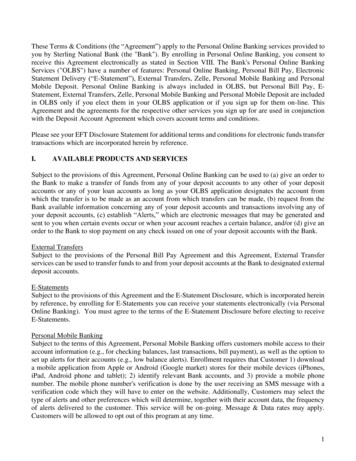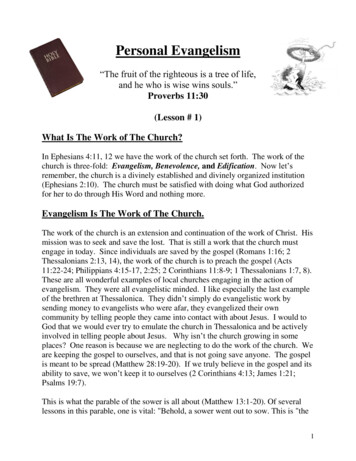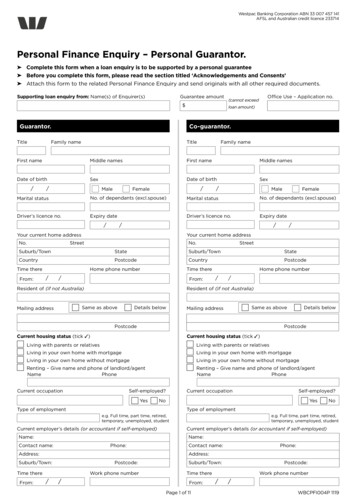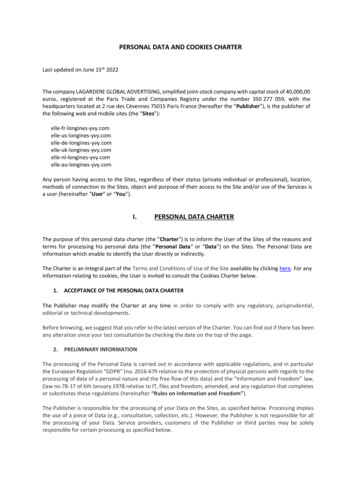
Transcription
Personal Study GuideS u m me r 2022 CS BUNDERSTANDEXPLOREAPPLY1, 2 Kings 2021 Lifeway Christian Resources
THE FIRST STEPThe old cliché states that a journey of a thousand miles begins with a singlestep. But if you truly want to get somewhere, that step has to be in the rightdirection. Otherwise, you’ll never reach your destination.God’s people took a lot of steps in 1, 2 Kings. Unfortunately, most of thosesteps led to dead ends. Evil kings ignored God’s covenant and followed theirown paths. They ruled with violence and injustice, and they promoted idolatryat every turn. Even when the Lord sent prophets to point them back to Him,the people ran in the opposite direction. A few good kings did what they couldto recalculate the trip; but, after a while, the damage was done.It’s easy to study the Israelites’ journey into exile with 20/20 hindsight,pointing out all the wrong turns they made. But we really can’t do that withoutshining a light on our own shortcomings. After all, left to rely on our owntwisted spiritual compass, we’re as prone to wander as they were.The simple truth is this: We all need God. We’re all broken by sin—and Heis the only One who can repair that damage. He longs for us to walk withHim and to accept His gift of salvation through Jesus. But that requiresturning around and charting a new course. It means taking that first step inthe right direction. Admit to God that you are a sinner. Repent, turning from your sin. By faith receive Jesus as God’s Son and accept His gift of forgivenessfrom sin. He took the penalty for your sin by dying on the cross. Confess your faith in Jesus Christ as Savior and Lord. You may pray aprayer similar to this as you call on God to save you: “Dear God, I knowthat You love me. I confess my sin and need of salvation. I turn awayfrom my sin and place my faith in Jesus as my Savior and Lord. In thename of Jesus I pray, amen.”After you have received Jesus Christ into your life, tell a pastor or anotherChristian about your decision. Show others your faith in Christ by asking forbaptism by immersion in your local church as a public expression of your faith. 2021 Lifeway Christian Resources
CONTENTSFEATURESWord Wise . . . . . . . . . . . . . . . . . . . . . . . . . . . . . . . . . . . . . . . . . . . . . . 6Bible Reading Plan . . . . . . . . . . . . . . . . . . . . . . . . . . . . . . . . . . . 7Introduction to 1, 2 Kings. . . . . . . . . . . . . . . . . . . . . . . . . .81, 2 Kings: Seeing the Big Picture . . . . . . . . . . 127Coming Next Quarter. . . . . . . . . . . . . . . . . . . . . . . . . . .130SESSIONSSUGGESTED FORTHE WEEK OFJune 5Session 1: Granted (1 Kings 3:4-15) . . . . . . . . . . . . . . . . . . . . . . . . . . . . . . . . 10June 12Session 2: Repentance* (1 Kings 8:46-60) . . . . . . . . . . . . . . . . . . . . . . . 19June 19Session 3: Compromised (1 Kings 11:1-13)June 26Session 4: Divided (1 Kings 12:6-19) . . . . . . . . . . . . . . . . . . . . . . . . . . . . . . . 37July 3Session 5: Return (1 Kings 15:9-22) . . . . . . . . . . . . . . . . . . . . . . . . . . . . . . . 46July 10Session 6: Proven (1 Kings 18:25-39) . . . . . . . . . . . . . . . . . . . . . . . . . . . . . 55July 17Session 7: Hope (1 Kings 19:9-18) . . . . . . . . . . . . . . . . . . . . . . . . . . . . . . . . . . 64July 24Session 8: God Heals (2 Kings 5:1-14)July 31Session 9: God Provides (2 Kings 7:1-15) . . . . . . . . . . . . . . . . . . . . . . . . 82August 7Session 10: God Honors (2 Kings 12:4-16) . . . . . . . . . . . . . . . . . . . . . . . . 91August 14Session 11: God Judges (2 Kings 17:7-20)August 21Session 12: God Hears (2 Kings 19:10-19,32-34) . . . . . . . . . . . . . . . 109August 28Session 13: God Moves (2 Kings 22:8-20) . . . . . . . . . . . . . . . . . . . . . . . . 118. . . . . . . . . . . . . . . . . . . . . . . . . . . . . . . . . . . . . . . . . . . . . . . . . . . . . . . . . . . . . . . . . . . . . .2873100*Evangelistic EmphasisE x pl or e t h e B i bl e 2021 Lifeway Christian Resources3
MEET THE WRITERG. B. Howell, Jr. wrote this study of 1, 2 Kings.Dr. Howell graduated from Carson-NewmanUniversity (Bachelor of Religion), MidwesternBaptist Theological Seminary (Master of Divinity;Master of Biblical Archaeology), and OxfordGraduate School (Doctor of Philosophy). He servedas content editor of Biblical Illustrator until hisretirement and is a member of Long Hollow BaptistChurch, Hendersonville, Tennessee.Explore the Bible: Adult Personal Study Guide CSB (ISSN 2330-9539; Item 005573495)is published quarterly by Lifeway Christian Resources, One Lifeway Plaza, Nashville, TN37234, Ben Mandrell, President. 2022 Lifeway Christian Resources.For ordering or inquiries, visit lifeway.com, or write Lifeway Church Resources CustomerService, One Lifeway Plaza, Nashville, TN 37234. For bulk shipments mailed quarterlyto one address, email orderentry@lifeway.com, fax 615.251.5933, or write to theabove address.We believe that the Bible has God for its author; salvation for its end; and truth, withoutany mixture of error, for its matter and that all Scripture is totally true and trustworthy.Read Lifeway’s full doctrinal guideline online at lifeway.com/doctrinalguideline. The KeyDoctrine statements in this study guide are adapted from these guidelines.Unless otherwise noted, all Scripture quotations are taken from the Christian StandardBible , Copyright 2020 by Holman Bible Publishers . Used by permission.Christian Standard Bible and CSB are federally registered trademarks of HolmanBible Publishers.The suggestions for pronouncing Bible names are from That’s Easy for You to Say: YourQuick Guide to Pronouncing Bible Names by W. Murray Severance, 1997 by Broadman& Holman Publishers. Used by permission.Explore the BibleAdult Personal Study GuideSummer 2022Volume 8, Number 4Mike LivingstoneContent EditorDwayne McCraryTeam LeaderKen BraddyDirector of Sunday SchoolBrian DanielDirector, Adult MinistrySend questions/comments toTeam Leader by email:Mike.Livingstone@lifeway.com;or by mail toTeam Leader, Explore the Bible:Adult Personal Study Guide,One Lifeway Plaza,Nashville, TN 37234-0175;or make comments on the web atlifeway.com.Printed in the United Statesof America4E x pl or e t h e B i bl e 2021 Lifeway Christian Resources
FROM THE TEAM LEADERGeorge Santayana is credited with saying that “Those who cannot remember thepast are condemned to repeat it.” Biographies and historical writings help us gaininsights into some of the whys and hows in history. We see people’s struggles and,in the process, identify with many of the same challenges they faced. We placeourselves in the story, wondering what we would have done had we faced thesame situation. Many of us would rather read history than fiction since history isfilled with compelling stories and teachable moments.First and Second Kings (and 2 Chronicles) cover 400 years of history and giveus a glimpse of what happens when God’s people live up to His expectations.Unfortunately, we see even more examples of what happens when people don’tlive up to those expectations.The same is true about us. At times, we all fail to live up to the expectations Godhas for us. We may repeat the same mistakes over and over, or we may be creativeby finding new ways to take a misstep. In 1 and 2 Kings, we will see the dangersof compromise, assuming God’s blessings, and ignoring God all together. Wealso find out that God offers forgiveness and hope to those who turn to Him inrepentance. His forgiveness should stir up our gratitude and motivate us to live alife that honors Him.Join us as we look at a slice of history and how God worked to accomplish Hispurposes and refine a people for Himself.In His service,G. Dwayne McCrarydwayne.mccrary@lifeway.comE x pl or e t h e B i bl e 2021 Lifeway Christian Resources5
WORD WISETerms listed here are identified in the Bible commentary with a dot ( ).Adoram / Adoniram [uh DOH ruhm / ad oh NIGH ruhm])—officer whooversaw the forced labor for Solomon (2 Sam. 20:24; 1 Kings 5:14); his name isspelled “Hadoram” in 2 Chronicles 10:18.Ahijah [uh HIGH juh ]—prophet who signaled to Jeroboam God’s decision todivide the kingdom after Solomon’s death (1 Kings 11:29-39)Ahikam [uh HIGH kam]—son of King Josiah’s scribe, Shaphan, who took thebook of the law to Huldah (2 Kings 22:8-20)Baasha [BAY uh shuh]—third king of the Northern Kingdom of Israel, reigned24 years (1 Kings 15:27–16:7)Hilkiah [hil KIGH uh]—high priest who found the book of the law during KingJosiah’s temple repairs (2 Kings 22:4-8)Huldah [HUHL duh]—a prophetess in Jerusalem who told King Josiah thatGod’s judgment was coming on Judah (2 Kings 22:14-20)Jeroboam [jer uh BOH uhm ]—Solomon’s servant, first king of the NorthernKingdom, Israel; reigned 22 years (1 Kings 11:26–14:20)Jehu [JEE hyoo]—two different men are named Jehu in 1, 2 Kings: (1) king ofthe Northern Kingdom, Israel (2 Kings 9:1–10:36); (2) prophet who proclaimedGod’s judgment on King Baasha of Israel (1 Kings 16:1-12); other men in the OldTestament named Jehu include a leader of the tribe of Simeon (1 Chron. 4:35)and a member of David’s army (1 Chron. 12:3).Jehoiada [jih HOY uh duh]—priest who protected Joash from Athaliah’sattempt to kill all the royal line; helped bring spiritual reform to Judah (2 Kings11:4-8; 11:17–12:3).Joash [JOH ash]—king of Judah, reigned 40 years; oversaw repairs to the temple(2 Kings 11:1–12:21); also known as “Jehoash”Josiah [joh SIGH uh]—king of Judah who initiated spiritual reform andcommissioned repair work on the temple; reigned 31 years (2 Kings 21:26–23:30)Rehoboam [ree huh BOH uhm ]—Solomon’s son and heir to the throne of theunited kingdom; the ten northern tribes revolted under his rule, thus dividingthe kingdom; reigned for 17 years (1 Kings 11:43)Shaphan [SHAY fan]—scribe and court secretary who reported to King Josiahthat the book of the law had been found in the temple (2 Kings 22:8-10)6E x pl or e t h e B i bl e 2021 Lifeway Christian Resources
BIBLE READING PLANJUNE 1. 1 Kings 1:1-212. 1 Kings 1:22-403. 1 Kings 1:41-534. 1 Kings 2:1-185. 1 Kings 2:19-336. 1 Kings 2:34-467. 1 Kings 3:1-158. 1 Kings 3:16-289. 1 Kings 4:1-3410. 1 Kings 5:1-1811. 1 Kings 6:1-2212. 1 Kings 6:23-3813. 1 Kings 7:1-1414. 1 Kings 7:15-3715. 1 Kings 7:38-5116. 1 Kings 8:1-2117. 1 Kings 8:22-3618. 1 Kings 8:37-5319. 1 Kings 8:54-6620. 1 Kings 9:1-1421. 1 Kings 9:15-2822. 1 Kings 10:1-1323. 1 Kings 10:14-2924. 1 Kings 11:1-1325. 1 Kings 11:14-2526. 1 Kings 11:26-4327. 1 Kings 12:1-1528. 1 Kings 12:16-3329. 1 Kings 13:1-1930. 1 Kings 13:20-34JULY 1. 1 Kings 14:1-162. 1 Kings 14:17-313. 1 Kings 15:1-154. 1 Kings 15:16-345. 1 Kings 16:1-206. 1 Kings 16:21-347. 1 Kings 17:1-168. 1 Kings 17:17-249. 1 Kings 18:1-2910. 1 Kings 18:30-4611. 1 Kings 19:1-2112. 1 Kings 20:1-1213. 1 Kings 20:13-3014. 1 Kings 20:31-4315. 1 Kings 21:1-1616. 1 Kings 21:17-2917. 1 Kings 22:1-1418. 1 Kings 22:15-3619. 1 Kings 22:37-5320. 2 Kings 1:1-1821. 2 Kings 2:1-2522. 2 Kings 3:1-1223. 2 Kings 3:13-2724. 2 Kings 4:1-1725. 2 Kings 4:18-3726. 2 Kings 4:38-4427. 2 Kings 5:1-1428. 2 Kings 5:15-2729. 2 Kings 6:1-1830. 2 Kings 6:19-3331. 2 Kings 7:1-20AUGUST 1. 2 Kings 8:1-152. 2 Kings 8:16-293. 2 Kings 9:1-154. 2 Kings 9:16-375. 2 Kings 10:1-176. 2 Kings 10:18-367. 2 Kings 11:1-218. 2 Kings 12:1-219. 2 Kings 13:1-1310. 2 Kings 13:14-2511. 2 Kings 14:1-1412. 2 Kings 14:15-2913. 2 Kings 15:1-2214. 2 Kings 15:23-3815. 2 Kings 16:1-2016. 2 Kings 17:1-2317. 2 Kings 17:24-4118. 2 Kings 18:1-1819. 2 Kings 18:19-3720. 2 Kings 19:1-1921. 2 Kings 19:20-3722. 2 Kings 20:1-1123. 2 Kings 20:12-2124. 2 Kings 21:1-1625. 2 Kings 21:17-2626. 2 Kings 22:1-2027. 2 Kings 23:1-2028. 2 Kings 23:21-3729. 2 Kings 24:1-2030. 2 Kings 25:1-1731. 2 Kings 25:18-30E x pl or e t h e B i bl e 2021 Lifeway Christian Resources7
INTRODUCTION TO 1, 2 KINGSThe book of Joshua begins with the declaration, “Moses my servant is dead”(Josh. 1:2). The death of Moses signified a dramatic change for the people of God.Similarly, the book of 1 Kings begins with the announcement that Israel’s KingDavid was near the end of his life. David had reigned for about forty years. Whowould be his successor? And for those who ruled after David, what would theirreigns be like? What would happen to Israel? The books of 1 and 2 Kings answerthese questions and more. They look at the history of the people of God fromwhen they were at their highest point—wealthy and unified—to when they wereat their lowest level—disgraced and broken.Themes of 1, 2 KingsDevotion to God—Would God’s people be devoted to Him alone? David’ssuccessor, his son Solomon, began his reign demonstrating loyalty to God. Intime, though, Solomon began to follow the gods of his foreign wives. No longerwas he devoted to God alone. Throughout 1 and 2 Kings, this disloyalty to Godappeared again and again among the kings and people of Israel and Judah. Somepracticed syncretism, worshiping foreign gods and the Lord; others rejectedGod completely.Reliability of God’s Word—The books of 1 and 2 Kings show that Godremained true to His word. What He foretold came to pass. He told Solomon thekingdom would be divided, and it was (1 Kings 11:29-37; 12:1-24). Through Elijah,He announced a famine, and it occurred (1 Kings 17:1–18:1). God said He woulduproot His people from the land of their ancestors and scatter them beyond theEuphrates, and He did (1 Kings 14:15-16; 2 Kings 17:6). Everything God saidwould happen, indeed happened.God’s judgment—Because God was true to what He had said, He broughtjudgment on the disobedient. The Lord had chosen this people to live in this landto be a witness for Him. But when they turned their backs on God and embracedthe gods of surrounding peoples, God responded with judgment.The books of 1 and 2 Kings show how God was justified in bringing destructionon His people.God’s grace—These two books offer glimmers of grace. The way God workedin the lives of the widow at Zarephath and Naaman revealed that His graceextended to all people of every nation and race (1 Kings 17:7-16; 2 Kings 5:1-15a).Additionally, speaking through every prophet and seer, God continually calledIsrael and Judah to repent and turn to Him (2 Kings 17:13).8E x pl or e t h e B i bl e 2021 Lifeway Christian Resources
OUTLINES1 KINGSI. Final Days of King David (1:1–2:12) (2 Chron. 1)II. Solomon’s Reign over the United Kingdom (2:13–11:43)(2 Chron. 2–9)III. The Divided Kingdoms of Judah and Israel (12:1–22:53)(2 Chron. 10–20)2 KINGSI. The Divided Kingdom: From Israel’s Ahaziah to the Fallof Israel (1:1–17:41) (2 Chron. 21–28)II. The Kingdom of Judah: From King Hezekiah to theCaptivity (18:1–25:30) (2 Chron. 29–36)ON T HE C OV ERIn 1850, archaeologists excavated Sennacherib’spalace in Nineveh. Inside, they discovered a seriesof stone slabs measuring eight feet tall by eightyfeet long that lined the palace walls. Carved in theslabs were scenes depicting Sennacherib besiegingLachish, one of the largest Judean cities heconquered in 701 BC. The scenes showed Assyriansoldiers shooting arrows, taking cover behind theirshields, and entering the city by way of a siege rampthey had built (see 2 Kings 19:32; session 12).E x pl or e t h e B i bl e 2021 Lifeway Christian Resources9
1SESSION 1GrantedGod offers wisdom to those who ask Him.1 KINGS 3:4-15Some of our choices are life altering. Deciding to get a side order ofpeas instead of carrots, though, is not. Neither is choosing where topark at the store, what socks to wear, or whether to mow the yardtoday or tomorrow. But choosing whether to stay in school, whoto marry, where to live—these are decisions with life-changingramifications. God gave young King Solomon an opportunity to makea decision that would affect the course of his life. Solomon’s selectionmay seem surprising, but it has lessons for us today.If God promised you that He would fulfill one request, what might it beand why?10 2021 Lifeway Christian Resources
UNDERSTAND THE CONTEXT1 KINGS 1:1–4:34 (2 CHRON. 1:1-17)For about forty years, David had served as Israel’s king. Plucked fromobscurity, he was God’s chosen man to follow Saul. But two factorsmarred David’s reign. First was his adulterous relationship withBathsheba and the resultant deaths of Uriah (Bathsheba’s husband)and David and Bathsheba’s son. The second was the constant conflictamong his children. Both Bathsheba and these sibling rivalries figureprominently at the beginning of 1 Kings.As 1 Kings opens, David was gravely ill; a young maiden wasbrought in to be his caregiver. Exploiting David’s weakened state, hisfourth son, Adonijah, made a play for the throne. Bathsheba heard ofAdonijah’s efforts and was determined instead that her son Solomonwould be Israel’s next king. She appealed to David, and he agreedSolomon would be the next king. As chapter 1 closes, Solomon hadbeen anointed king and showed mercy to his half-brother Adonijah bysparing his life.Chapter 2 records David’s dying instructions to Solomon. Beingobedient to God’s covenant would ensure success and security. Thiscall to obedience serves as a major theme of 1 and 2 Kings. Chapters3 and 4 highlight Solomon’s achievements. He married an Egyptianprincess, built the palace and temple in Jerusalem, and put able menin places of leadership. When God offered to give Solomon whatever hewished, the king asked for discernment. God granted him this, and allthe people benefited from Solomon’s wisdom.One verse sounds a distant drumbeat and foreshadows Solomon’sAchilles’s heel: “Solomon loved the Lord by walking in the statutesof his father David, but he also sacrificed and burned incense on thehigh places” (1 Kings 3:3). Would Solomon walk in righteousness ashis father had done? And what about the kings who would follow?As you read 1 Kings 3:4-15 in your Bible, underline the request Solomonmade of God. How does Solomon’s request help us understand theimportance of aligning our desires with God’s purposes in our prayers?Se s s ion 1 : G ra nt e d 2021 Lifeway Christian Resources11
EXPLORE THE TEXTGOD OFFERS (1 KINGS 3:4-5)4The king went to Gibeon to sacrifice there because it was the mostfamous high place. He offered a thousand burnt offerings on thataltar. 5 At Gibeon the Lord appeared to Solomon in a dream atnight. God said, “Ask. What should I give you?”VERSES 4-5Gibeon, located about five miles northwest of Jerusalem, was atan elevation of about 2,400 feet. The name reflects the height, asGibeon translates as “hill place.” Archaeological evidence indicatesthis Canaanite city dated as far back as about 3000 BC, had beena Canaanite fortress, and evidently had never been destroyed—atestimony to its importance and strength. The Canaanites’ paganworship typically took place on the hilltops that dotted the region.After his inaugural address (2 Chron. 1:2), Solomon traveled fromJerusalem to the high place at Gibeon. Although David had movedthe ark of the covenant to Jerusalem, the tabernacle and bronzealtar that Moses had constructed in the wilderness had been set upat Gibeon, making it a central place of Hebrew worship at that time(2 Sam. 6:17; 2 Chron. 1:3-5). In a lavish display of sincere worshipand devotion, Solomon sacrificed a thousand burnt offerings tothe Lord.BIBL E SK IL L: Read, reflect on, and react emotionally to a Bible verse.Read reflectively God’s invitation to Solomon in 1 Kings 3:5. SupposeGod appeared to you and offered you the chance to have one thing fromHim. Consider the many good things you could ask for. How would yourlife be different if it were fully aligned with God’s purpose?12E x pl or e t h e B i bl e P e r s on a l S t u dy G u i de 2021 Lifeway Christian Resources
God appeared to Solomon in a dream and presented him with anopen-ended offer: What should I give you? Solomon’s response wouldreveal his heart.How does our worship help prepare us to hear from God? What do ourprayer requests reveal about our hearts?SOLOMON ANSWERS (1 KINGS 3:6-9)6And Solomon replied, “You have shown great and faithful loveto your servant, my father David, because he walked before youin faithfulness, righteousness, and integrity. You have continuedthis great and faithful love for him by giving him a son to sit onhis throne, as it is today. 7 “Lord my God, you have now made yourservant king in my father David’s place. Yet I am just a youth withno experience in leadership. 8 Your servant is among your peopleyou have chosen, a people too many to be numbered or counted.9So give your servant a receptive heart to judge your people and todiscern between good and evil. For who is able to judge this greatpeople of yours?”VERSE 6Solomon began his reply by highlighting God’s character. He statedthat God had shown His great and faithful love. When the Lordappeared to Moses on Mount Sinai, He used the same term todescribe Himself: “The Lord . . . is a compassionate and gracious God,slow to anger and abounding in faithful love and truth, maintainingfaithful love to a thousand generations, forgiving iniquity, rebellion,and sin” (Ex. 34:6-7a).Solomon then connected God’s great and faithful love to his fatherDavid. God had shown David great and faithful love because he hadwalked in faithfulness, righteousness, and integrity. God continuedto demonstrate His love for David by allowing his son Solomon to siton his throne. The fact that Solomon was on the throne of his fatherDavid was evidence of God’s continued faithfulness to His promises.(See 2 Sam. 7:12-13.)Se s s ion 1 : G ra nt e d 2021 Lifeway Christian Resources13
VERSES 7-8Solomon knew he was inadequate for the job. He was a servant, hewas just a youth, and he lacked experience in leadership. He was tofollow the great King David, his father, to rule God’s people. AlthoughSolomon was relatively young at this point, he was likely in his earlytwenties and old enough to be married and to have fathered a child.(See 1 Kings 11:42; 14:21.) Referring to his youth was Solomon’s wayof saying he still felt immature and unprepared for the challengebefore him.Solomon recognized that he was in this position of leadershipbecause the Lord had placed him there: you have now made yourservant king. He was affirming his dependency on God. As God hadbeen faithful to David, Solomon was depending on God to show Hiscontinued faithfulness. You can almost hear Solomon saying, “Oh God, Ido need you and need your help!” Solomon’s words are a reminder of thefamiliar adage, “God does not call the equipped; He equips the called.”VERSE 9Having affirmed God’s goodness and grace, Solomon was ready tomake his request in sincerity and humility. He asked for a receptiveheart. The Hebrew term carries the idea of a heart that both hearsand obeys. Solomon saw the advantage of such a heart—it wouldallow him to judge God’s people correctly and to discern what wasgood and what was evil.Second Chronicles uses a bit of different terminology to describeSolomon’s request: “Now grant me wisdom and knowledge so that Imay lead these people, for who can judge this great people of yours?”(2 Chron. 1:10). His request was simple yet profound. Solomon knewthat having wisdom, knowledge, and a receptive heart would givehim what he needed to judge God’s people. The Hebrew word for judgecarries the idea of governing, ruling, and executing judgment. He wasasking for the ability to administer justice as king and for God to givehim all that he might need to be able to lead the people of Israel.Notice throughout verses 6-9 Solomon’s repetitive use of thepronouns you and your. Solomon’s focus was not on himself but on theLord. Solomon knew the Lord had given him a God-sized task andthat success would come only because of God’s ability and strength,not because of his own.14E x pl or e t h e B i bl e P e r s on a l S t u dy G u i de 2021 Lifeway Christian Resources
Identify other examples in Scripture when people felt inadequate for thejob or task God had called them to do. Why might God call people who feelinadequate for the task?GOD PROVIDES (1 KINGS 3:10-15)10Now it pleased the Lord that Solomon had requested this. 11 SoGod said to him, “Because you have requested this and did not askfor long life or riches for yourself, or the death of your enemies,but you asked discernment for yourself to administer justice,12I will therefore do what you have asked. I will give you a wise andunderstanding heart, so that there has never been anyone like youbefore and never will be again. 13 In addition, I will give you whatyou did not ask for: both riches and honor, so that no king will beyour equal during your entire life. 14 If you walk in my ways andkeep my statutes and commands just as your father David did, Iwill give you a long life.” 15 Then Solomon woke up and realized ithad been a dream. He went to Jerusalem, stood before the ark ofthe Lord’s covenant, and offered burnt offerings and fellowshipofferings. Then he held a feast for all his servants.VERSES 10-14God was pleased with Solomon’s request (v. 9). He also is pleasedwhen our prayer requests line up with His work and purpose for ourlives and world. Jesus taught His followers, “My Father is glorified bythis: that you produce much fruit and prove to be my disciples” (John15:8). Our prayers should be that we bear much fruit and therebyshow that we are Christ followers.God was pleased both with what Solomon did not ask for andwith what he requested. Solomon’s request comes across as beingcompletely selfless.How can what a person doesn’t ask for when praying be just as telling aswhat is requested?Se s s ion 1 : G ra nt e d 2021 Lifeway Christian Resources15
DID YOU K NOW ?Jesus twice mentioned Solomon in His teaching: (1) in His teachingabout anxiety (Matt. 6:29; Luke 12:27), and (2) that the queen of Shebacame from the ends of the earth to hear Solomon’s teaching, yet“something greater than Solomon is here” (Matt. 12:42; Luke 11:31).Because God was pleased with Solomon’s request, He promised: Iwill therefore do what you have asked. The verses that follow showhow God would fulfill Solomon’s request and give the king even more.Describing what He would do, God three times pledged, I will giveyou (vv. 12,13,14).First, God promised to give Solomon a heart that was wise andunderstanding. Solomon wanted a receptive heart so he couldadminister justice as the ruler of God’s people. Instead of limitingHis gift—giving him common understanding—God promisedSolomon would become a virtual encyclopedia of knowledge.First Kings 4:29-30 describes his unsurpassed wisdom as beinggreater than the wisdom possessed by all other people.God was the source of allthe good things that wouldcome in Solomon’s life.The book of James describes God-given wisdom: “But the wisdomfrom above is first pure, then peace-loving, gentle, compliant, fullof mercy and good fruits, unwavering, without pretense” (Jas. 3:17).In James we also find that God will give wisdom to those whoask: “Now if any of you lacks wisdom, he should ask God—whogives to all generously and ungrudgingly—and it will be given tohim” (Jas. 1:5).Second, God promised Solomon more riches and honor than anyother king. Solomon saw this promise fulfilled in his lifetime: “KingSolomon surpassed all the kings of the world in riches and in wisdom.The whole world wanted an audience with Solomon to hear thewisdom that God had put in his heart” (1 Kings 10:23-24).16E x pl or e t h e B i bl e P e r s on a l S t u dy G u i de 2021 Lifeway Christian Resources
God’s third promise had a provision. God promised Solomona long life if he would walk in obedience as his father, David,had done.God was the source of all the good things that would come inSolomon’s life—wisdom, understanding, wealth, honor, and lengthof days. Solomon reigned during what came to be called “Israel’sgolden age.” His kingship was marked by peace and prosperity. Godhad granted Solomon his desire and had given him even more thanhe asked for. This testifies of the lavish generosity of God.Does God always give us what we ask for? What might affect whether ornot we receive from God what we request?VERSE 15The events in these verses end as they began, with Solomon offeringworship to God. Rather than at Gibeon, though, he traveled the fivemiles back to Jerusalem and stood before the ark, which representedthe presence of God among His people. In his dream, he hadconversed with God and received God’s promises. In spite of the factthat promises had not yet been fulfilled, Solomon offered God praisenonetheless. Solomon knew God was worthy of worship, thus offeringHim praise and adoration was a priority in Solomon’s life.Herein is a slight distinction for believers—the difference ingiving God praise and giving thanks. We praise God for who He is,but we thank Him for what He has done.K E Y DOC TRINE: ManOnly the grace of God can bring man into His holy fellowship andenable man to fulfill the creative purpose of God. (See Psalm 8:3-6;1 Corinthians 1:26-29.)Se s s ion 1 : G ra nt e d 2021 Lifeway Christian Resources17
APPLY THE TEXT Worship is the first step toward God and His blessings. Life’s challenges point to our need for God’s wisdom. God answers prayers in ways that align with His purposesand heart.List the traits and characteristics of God that cause you the greatest awe.How can you affirm those traits in words of praise to Him? Write a prayerof praise here.Discuss as a group a potential God-sized task o
God's judgment was coming on Judah (2 Kings 22:14-20) Jeroboam [jer uh BOH uhm ]—Solomon's servant, first king of the Northern Kingdom, Israel; reigned 22 years (1 Kings 11:26-14:20) Jehu [JEE hyoo]—two different men are named Jehu in 1, 2 Kings: (1) king of the Northern Kingdom, Israel (2 Kings 9:1-10:36); (2) prophet who proclaimed










